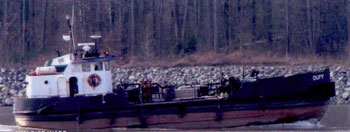Double Hull Rule Costly for Fuel Boat
by Steve Cartwright

Maine Coast Petroleum’s 59-foot oil carrier DUFF in Tenants Harbor. The company also has two Rockland-based boats that bring heating oil, diesel fuel, gasoline and kerosene to island communities from Frenchboro to Monhegan. The federal double hull regulation goes into effect in 2015. Maine Coast Petroleum photo
A deadline for oil tankers to be double-hulled could be double trouble for a firm supplying Penobscot Bay islands.
A federal rule created in 1990 after the disastrous Exxon Valdez oil spill in Alaska, the double-hull requirement takes effect in 2015 and applies to small vessels carrying oil as well as supertankers. That directly affects Maine Coast Petroleum in Tenants Harbor and its two Rockland-based boats that bring heating oil, diesel fuel, gasoline and kerosene to island communities from Frenchboro to Monhegan.
Terry Banda, office manager for Maine Coast Petroleum, said retrofitting the larger of its two steel vessels, the 59-foot DUFF, would cost from $300,000 to $600,000. It would cut the vessel’s 40,000-gallon carrying capacity in half and “it could mean higher prices for customers. The owner of the company (Dale O’Neal) does not want to do that because they already pay enough,” she said.
Banda said a double-hull makes sense for the safety of a supertanker carrying crude oil. She questions whether the same standard should be used for a small boat delivering refined oil. Her company’s boats carry emergency clean-up material and clean-up firms are on call should a spill ever occur.
If higher prices cost Maine Coast Petroleum the island fuel business, the investment in a double hull would also be lost, Banda said. Fuel trucks can serve islands that have state ferry service, but that would exclude Monhegan, Frenchboro and a number of private islands served by the company’s steel fuel vessel.
“We wouldn’t have power here without an oil boat,” said Paul Murray, who runs the diesel generators that supply electricity on Matinicus. He said he has received reliable service over the years from Maine Coast Petroleum, which eight years ago took over island fuel delivery from the defunct McLoon company in Rockland. He said the island generators burn 40,000 gallons of fuel per year, and a number of year-round residents use oil to heat their homes. Islanders drive their trucks to the dock for a fill-up when the fuel boat visits, and they bring 5-gallon cans to fill, as well.
The company is loyal to its island customers who depend on daily, weekly or monthly deliveries, Banda said. Maine Petroleum, with help from the Island Institute, has explained its predicament to Maine’s Congressional delegation. Willy Ritch, spokesman for Rep. Chellie
Pingree, said she is continuing to look for possible financial aid. “She knows how expensive fuel is...it’s not just the money. It’s the key to the long-term survivability of the islands.”
Pingree lives on North Haven, an island served by Maine Coast Petroleum. “This is a sticky problem,” Ritch said. “She’s had her staff shake the money tree. There’s not a lot out there.”
Ritch said the U.S. Coast Guard isn’t about to give a small vessel an exemption from a rule that dates back 20 years. Banda acknowledged her company has procrastinated a bit in the face of a costly retrofit, but has been hoping to find a way to be excluded from the regulation. A state-run program for clean engines could offer some benefit to the company, but would only apply to re-powering with a new, less-polluting diesel engine.
Suzanne Pude, community energy director for the Island Institute, said she has been trying to “bring resources to the table” to help Maine Coast Petroleum be a lifeline to the islands.
Rockland Marine, a shipyard specializing in steel vessels, has estimated it could add an inner hull to the DUFF in about three months, Banda said.
On Matinicus, Murray was sympathetic to Maine Coast Petroleum’s plight. “I don’t see any real easy solution to it. This is a critical service. It seems there must be some way to assist them.”
Maine Coast Petroleum’s O’Neal reaffirmed his commitment to serving Penobscot Bay islands while complying with the law: “We will move forward with the project because we have to, and we will do our best to not pass the expense of this to the island customers.”
